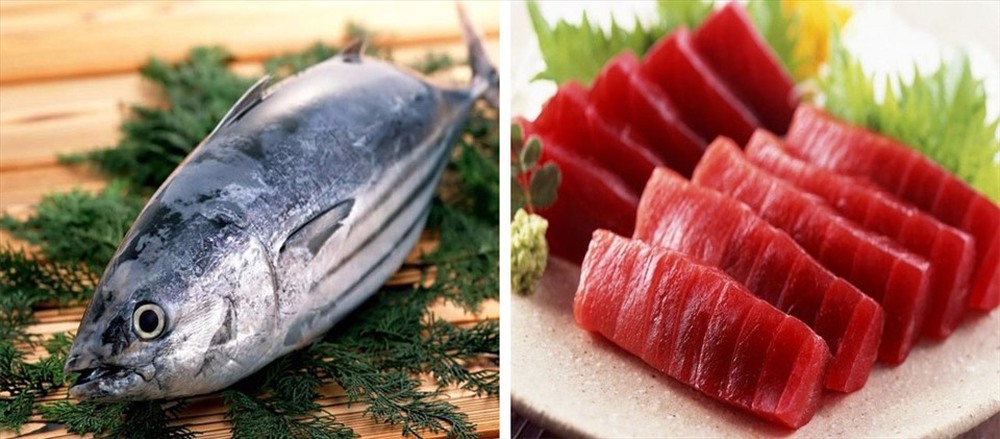During the subsidy period, protein (protein) is nutritional gold, fat is lacking, let alone protein. What moves is protein, is edible. Yet many people look at tuna, braised mackerel, do not dare to eat. Craving so much but still having to abstain, still abstain now. Unfortunately, they mistook the poisoning for an allergy.
Sometimes poisoning and allergies have similar symptoms such as nausea, vomiting, diarrhea, urticaria… so it is easy to confuse.
– Food poisoning occurs when eating food contaminated with toxins or harmful microorganisms.
– Allergy (allergy) occurs when the body’s immune system reacts against a certain protein that enters the body through eating, breathing, etc., such as a peanut allergy.
This article only talks about seafood poisoning, and food allergies will be covered in another article.
Tuna really causes poisoning?
Simply, because in the fish there are substances … toxic. That poison was identified as histamine, so science called it histamine poisoning.
In fact, in fish, there is no histamine toxin available, but due to poor preservation of fish, histamine is released. It should be distinguished from the case of eating puffer fish poisoning, because the viscera already contain tetrodotoxin toxins.
How does histamine form poisoning?
The mechanism of histamine formation in fish meat due to poor preservation is a bit cumbersome:
– An amino acid found in fish, called histidine, is converted to histamine under the action of enzymes. This enzyme is produced by bacteria.
– However, only foods with a lot of free histidine, that is, the type of histidine that is not bound to proteins, can be converted to histamine.
Thus, to form toxic histamine, two conditions must be met: The fish has a lot of free histidine, and the fish is infected with bacteria.
Not all fish cause histamine poisoning
Fish belonging to the Scombridae family such as mackerel, tuna, etc., are born with a lot of free histidine, if infected, a lot of histamine will be generated.
But not all bacteria help produce histamine? Only certain strains of bacteria can secrete enzymes to convert free histidine to histamine. The source of this bacteria is both in fish, in sea water or in the air.
That’s why fish of the family Scombridae, if not stored well, will easily produce toxic histamine (also known as scombrotoxin poisoning).
Some other fish such as sardines (sardine), salmon (salmon), herring …, in general, migratory fish, fast swimming, finned fish, red meat can all produce histamine at high levels. high. Even anchovies for fish sauce also produce histamine, although not much.

Illustration: Fish belonging to the family Scombridae such as mackerel, tuna, etc. have a lot of free histidine. If the bacteria is infected, a lot of histamine will be generated.
Not only sea fish, but some other foods such as Swiss cheese can also cause scombrotoxin poisoning, if the amount of histamine produced is large enough to cause poisoning.
Other fermented products such as fish sauce, spring rolls,… all have histamine, but not much.
Traditional fish sauce made from anchovies, scads should have quite a lot of histamine, but because the consumption is too small, about 10-15 ml/day, almost no cases of histamine poisoning due to fish sauce have been recorded.
Only industrial fish sauce is absent, or has very little histamine because the amount of fish in fish sauce is very little.
Eating sea fish together, some people get poisoned, some people don’t?
The human body can tolerate a certain amount of histamine, because when histamine enters the body, it will be broken down by enzymes. Therefore, in order to cause poisoning, it is necessary to consume foods with high levels of histamine, or enzymes in the body that for some reason are inhibited from breaking down histamine.
Poisoning also depends on the body of each person. At 8-40 mg of histamine, some susceptible individuals may exhibit some mild symptoms of toxicity.
The amount of histamine is not evenly distributed in the fish, the dark red meat has more histamine than the white meat. Histamine is very stable to heat, so fish, whether frozen, canned, smoked, cooked in hot pot… can cause poisoning once high histamine is generated.
Why confuse poisoning with allergies?
Symptoms of histamine poisoning and allergies are very similar, also causing itching, redness, swelling of the face and nose, dizziness, headache, difficulty breathing, abdominal pain… However, in some cases, allergies can can be serious and fatal. Histamine poisoning usually goes away on its own after a few days.
Seafood shrimp, crab, fish, squid in general can both cause allergies and poisoning, but very rarely. Sea fish such as mackerel, tuna, herring, etc. are often more likely to have histamine poisoning than to cause allergies.
Therefore, if you eat sea fish and have symptoms of redness, itching, etc., do not rush to conclude that you are allergic and abstain. If the same fish, the next time I eat it fresh, or freeze it, but still have rashes, even difficulty breathing… then I am allergic to that type of fish. If you are allergic to any type of fish, you should avoid that type of fish.
During the subsidy period, we bought and distributed several hundred grams of tuna, mackerel, and generally marine fish. At that time, the means of transportation and maintenance were poor. Since catching, through many stages of distribution, to the buyer, the fish is not well preserved, so histamine poisoning often occurs. Since then, many people have been obsessed, whenever they see seafood, they abstain.
A blood test can determine if you are allergic to something. As for sea fish, this time it was itchy, swollen lips due to fish preservation, but next time the fish is well preserved, it’s okay to eat. But I thought it was too much of an allergy to abstain from sea food… a waste.
at Blogtuan.info – Source: Soha.vn – Read the original article here




